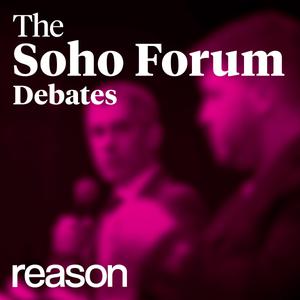
The Soho Forum Debates
The Soho Forum Debates
Free minds and free markets. Reason.com is the leading libertarian magazine and video website covering news, politics, culture, and more with reporting and analysis.
- 1 hour 33 minutesA Soho Forum Discussion of COVID with Tom Woods
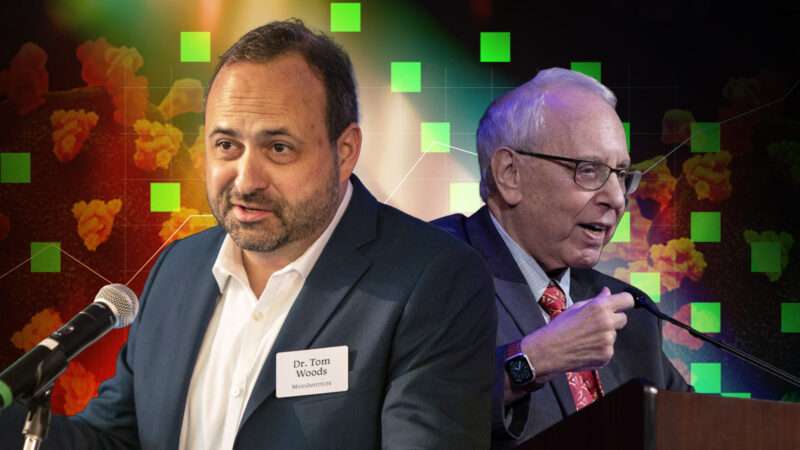
Important Update from The Soho Forum: "[We regret] to inform you of a significant change to tonight's debate between Brent Orrell and Tom Woods. Unfortunately, Brent Orrell will not be able to participate as his granddaughter tragically passed away over the weekend. Our hearts go out to Brent and his family during this difficult time. In light of this, we've made adjustments to the event to ensure it can still proceed. Our director Gene Epstein will read, word-for-word, the script that Brent prepared, along with the slides Brent submitted. Tom Woods will then make his case for the negative. In lieu of an Oxford-style before/after voting, we will extend the Q&A portion and conclude the program with a 5-mins summation from Tom Woods."
The originally scheduled event was as follows:
Brent Orrell of the American Enterprise Institute and podcaster and author Tom Woods debate the resolution, "Government-imposed restrictions during the Covid pandemic were prudent and essential."
Taking the affirmative is Brent Orrell, a senior fellow at the American Enterprise Institute focusing on job training, work force development, and criminal justice reform. Orrell has over 20 years of experience in the executive and legislative branches of government and was nominated by President George W. Bush to lead the Employment and Training Administration at the U.S. Department of Labor. During the COVID-19 pandemic, he wrote extensively on the impact of the disease on working conditions and the role of social distancing policies and practices in protecting worker and public health.
Taking the negative is Tom Woods, the host of The Tom Woods Show and author of 13 books, including latest Diary of a Psychosis: How Public Health Disgraced Itself During COVID Mania. He won the $50,000 first-place prize in the Templeton Enterprise Awards for his book The Church and the Market and was the winner of the 2019 Hayek Lifetime Achievement Award, given in Vienna by the Hayek Institute and the Austrian Economics Center.
The post A Soho Forum Discussion of COVID with Tom Woods appeared first on Reason.com.
26 April 2024, 4:10 pm - 1 hour 32 minutesDid Capitalism Fail During the Pandemic?

Joe Nocera of The Free Press and Gene Epstein of The Soho Forum debate the resolution, "Capitalism has been a key factor in leaving the United States unprepared to address the COVID-19 pandemic."
Taking the affirmative is Nocera, a columnist for The Free Press and co-author (with Bethany McLean) of The Big Fail: What the Pandemic Revealed About Who America Protects and Who It Leaves Behind. His business journalism has appeared in numerous publications, including Esquire, Bloomberg, and The New York Times.
Arguing against the resolution is Epstein, the executive director of the Soho Forum. He is the former economics and books editor of Barron's, a position he left in January 2018 after a 26-year stint. He frequently appears on libertarian podcasts, especially The Tom Woods Show.
The post Did Capitalism Fail During the Pandemic? appeared first on Reason.com.
5 April 2024, 8:35 pm - 1 hour 28 minutesWhat's the Root Cause of the Israeli-Palestinian Conflict?

Reporter and podcaster Eli Lake and author Jeremy Hammond debated the resolution, "The root cause of the Israeli-Palestinian conflict is the Palestinians' rejection of Israel's right to exist."
Taking the affirmative is Lake, the former senior national security correspondent for The Daily Beast and Newsweek. He is currently a reporter at The Free Press and host of The Re-Education podcast. He has also contributed to CNN, Fox News, C-SPAN, Charlie Rose, the I Am Rapaport: Stereo Podcast, and Bloggingheads.tv.
Hammond, an independent journalist and author, takes the negative. He is the author of several books, including Obstacle to Peace: The US Role in the Israeli-Palestinian Conflict.
- Video and Audio Editing: John Osterhoudt
The post What's the Root Cause of the Israeli-Palestinian Conflict? appeared first on Reason.com.
1 March 2024, 8:30 pm - 1 hour 29 minutesMust Government Fund Science?
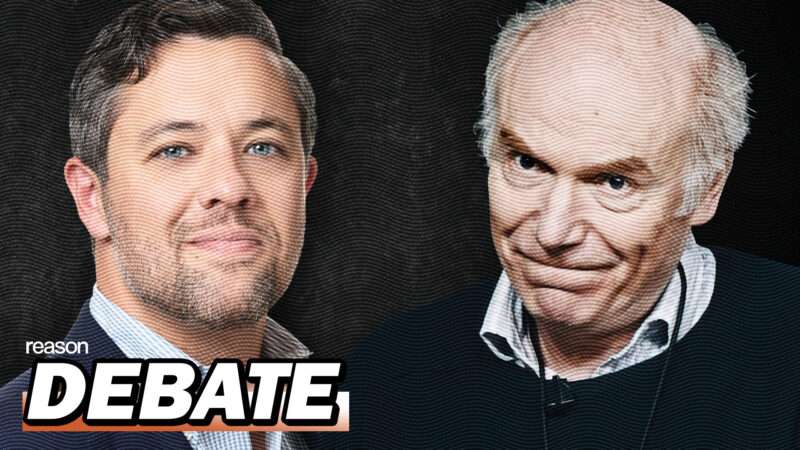
M. Anthony (Tony) Mills of the American Enterprise Institute and Terence Kealey of The Cato Institute debate the resolution, "Government must play a role in fostering scientific and technological progress by funding basic research."
Defending the resolution is Mills, a senior fellow and director of the Center for Technology, Science, and Energy at the American Enterprise Institute. He is also a senior fellow at the Pepperdine School of Public Policy and a scholar associate of the Society of Catholic Scientists. Dr. Mills was previously a resident senior fellow at the R Street Institute and an editor for numerous publications. His writings have appeared in The New York Times, The Wall Street Journal, The New Atlantis, National Affairs, Issues in Science and Technology, and various peer-reviewed journals. He holds a Ph.D. in philosophy from the University of Notre Dame.
Taking the negative is Kealey, an adjunct scholar at the Cato Institute. Originally trained in medicine and biochemistry, he is a former lecturer in clinical biochemistry at the University of Cambridge. Between 2001 and 2014 he was the vice-chancellor of the University of Buckingham. He is known for his 1996 book, The Economic Laws of Scientific Research.
The post Must Government Fund Science? appeared first on Reason.com.
2 February 2024, 7:15 pm - 1 hour 31 minutesSocial Media Censorship and The First Amendment

Should the federal government be able to "urge," "encourage," "pressure," or "induce" social media companies into censoring free speech about COVID-19? A recent ruling in federal court said no. That ruling is the subject of this month's Soho Forum Debate between law professor Kate Klonick and professor of medicine Dr. Jay Bhattacharya. The resolution is: "The making of national internet policy was hindered, rather than helped, by the July 4th federal court ruling that restricted the Biden administration's communications with social media platforms."
Arguing for the affirmative is Kate Klonick, an associate professor at St. John's University Law School, a fellow at the Brookings Institution, and a distinguished scholar at the Institute for Humane Studies. Her writing has appeared in the Harvard Law Review, Yale Law Journal, The New Yorker, The New York Times, The Atlantic, The Washington Post, and numerous other publications.
Arguing against the resolution is Jay Bhattacharya, M.D. Ph.D., a professor of medicine at Stanford University. He is a research associate at the National Bureau of Economics Research, as well as a senior fellow at the Stanford Institute for Economic Policy Research and at the Stanford Freeman Spogli Institute for International Studies. His research focuses on the economics of health care around the world with a particular emphasis on the health and well-being of vulnerable populations. His peer-reviewed research has been published in economics, statistics, legal, medical, public health, and health policy journals. Dr. Bhattacharya was one of three main co-signatories of the Great Barrington Declaration of October 2020, an open letter published in response to the COVID-19 pandemic and lockdowns.
The post Social Media Censorship and The First Amendment appeared first on Reason.com.
22 December 2023, 5:10 pm - 1 hour 45 minutesWill AI Destroy Humanity?

Susan Schneider of the Center for the Future Mind and AI entrepreneur Jobst Landgrebe debate the resolution, "Artificial intelligence poses a threat to the survival of humanity that must be actively addressed by government."
For the affirmative is Schneider, the director of the Center for the Future Mind at Florida Atlantic University. She previously held the NASA chair and the distinguished scholar chair at the Library of Congress. In her recent book, Artificial You: AI and the Future of Your Mind, she discusses the philosophical implications of AI and, in particular, the enterprise of "mind design." She also works with Congress on AI policy, appears on PBS and the History channel, and writes opinion pieces for The New York Times, Scientific American, and the Financial Times.
Taking the negative is Landgrebe, an entrepreneur and researcher in the field of artificial intelligence working on the mathematical foundations and the philosophical implications of AI-based technology. In 2013, he founded the company Cognotekt, where he serves as managing director. Together with philosopher Barry Smith, he co-authored Why Machines Will Never Rule the World: Artificial Intelligence without Fear. He is also a research associate in the philosophy department at the University at Buffalo.
The post Will AI Destroy Humanity? appeared first on Reason.com.
17 November 2023, 10:15 pm - 1 hour 36 minutesWill Electric Cars Disappoint Environmentalists?

The Manhattan Institute's Mark Mills and InOrbis CEO Rosario Fortugno debate the resolution, "Between now and 2035, electric vehicles in the consumer market will disappoint environmentalists by remaining a product bought mainly by the well-heeled minority."
Taking the affirmative is Mills, a Manhattan Institute senior fellow, a faculty fellow at Northwestern University's engineering school, and a partner in Montrose Lane, an energy-tech venture fund. He is author of the book The Cloud Revolution: How the Convergence of New Technologies Will Unleash the Next Economic Boom and a Roaring 2020s.
Taking the negative is Fortugno, the CEO of InOrbis, a company that works to develop technologies for electric vehicle fleet management, autonomous vehicles, and machine learning. He blogs at ApplyingAI.com on the topics of free markets, electric vehicle adoption, and the benefits of artificial intelligence.
The post Will Electric Cars Disappoint Environmentalists? appeared first on Reason.com.
20 October 2023, 5:45 pm - 1 hour 26 minutesWould Anarcho-Capitalism Be a Disaster?
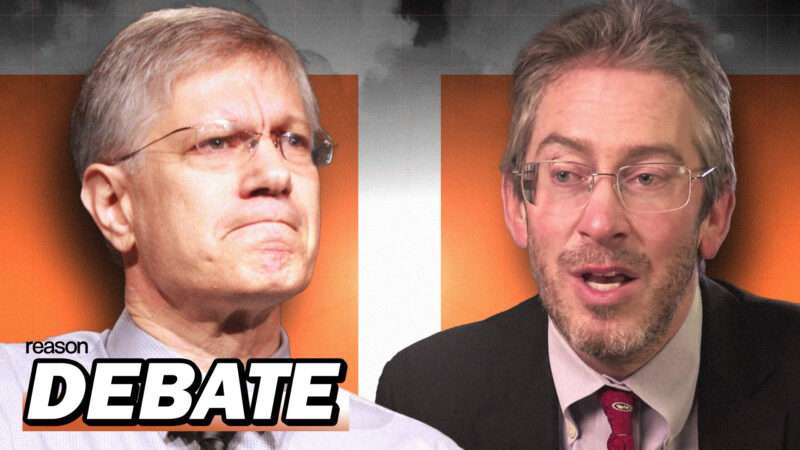
Chairman of the Ayn Rand Institute Yaron Brook and George Mason University professor Bryan Caplan debate the resolution, "Anarcho-capitalism would definitely be a complete disaster for humanity."
Taking the affirmative is Brook, host of The Yaron Brook Show. He was the executive director of The Ayn Rand Institute from 2000 to 2017 and is now the chairman of the board. Brook has co-authored many books focused on capitalism and the benefits of free markets, including In Pursuit of Wealth: The Moral Case for Finance, Equal Is Unfair: America's Misguided Fight Against Income Inequality, and Free Market Revolution: How Ayn Rand's Ideas Can End Big Government. He was a columnist at Forbes and has been featured in the Wall Street Journal, USA Today, Investor's Business Daily, and more.
Caplan, a professor of economics at George Mason University, is taking the negative. He's The New York Times bestselling author of The Myth of the Rational Voter, Selfish Reasons to Have More Kids, The Case Against Education, and more. He writes for the Substack Bet On It, and has been published in The New York Times, Washington Post, Wall Street Journal, Reason, and more.
The post Would Anarcho-Capitalism Be a Disaster? appeared first on Reason.com.
22 September 2023, 3:55 pm - 1 hour 26 minutesShould Libertarians Support School Choice?

Education activist Corey DeAngelis and attorney Stephan Kinsella debate the resolution, "Today's school-choice movement in the U.S. is worthy of support by libertarians."
Taking the affirmative is DeAngelis, a senior fellow at the American Federation for Children. He is also the executive director at the Educational Freedom Institute, an adjunct scholar at the Cato Institute, a senior fellow at Reason Foundation, and a board member at the Liberty Justice Center. He was named on the Forbes 30 under 30 list for his work on education policy and received the Buckley Award from America's Future in 2020.
Taking the negative is Kinsella, a libertarian writer and patent attorney. He was previously general counsel for Applied Optoelectronics, Inc., and an adjunct law professor at South Texas College of Law Houston. His publications include Against Intellectual Property, International Investment, Political Risk, and Dispute Resolution, and a forthcoming book Legal Foundations of a Free Society.
The debate was held at New York City's Sheen Center and hosted by The Soho Forum, which receives fiscal sponsorship from Reason Foundation, the nonprofit that publishes Reason.
The post Should Libertarians Support School Choice? appeared first on Reason.com.
25 August 2023, 3:30 pm - 1 hour 41 minutesShould the U.S. Have Free Immigration?

The Cato Institute's Alex Nowrasteh and attorney Francis Menton debate the resolution, "The U.S. should have free immigration except for those who pose a security threat or have a serious contagious disease."
Taking the affirmative is Nowrasteh, the vice president of economic and social policy studies at the Cato Institute, where most of his work has focused on immigration. He's the co-author (with Benjamin Powell) of Wretched Refuse?: The Political Economy of Immigration and Institutions. A native of Southern California, Nowrasteh received a master's degree in economic history from the London School of Economics.
Taking the negative is Menton, who writes at manhattancontrarian.com and was a litigation partner at Willkie Farr & Gallagher LLP before retiring in December 2015 after over 40 years with the firm.
The debate was held at New York City's Sheen Center and hosted by The Soho Forum, which receives fiscal sponsorship from Reason Foundation, the nonprofit that publishes this site.
Audio editing by John Osterhoudt.
The post Should the U.S. Have Free Immigration? appeared first on Reason.com.
28 July 2023, 1:00 pm - 1 hour 35 minutesIs the Nonaggression Principle Incoherent?

Economist and libertarian David Friedman and Soho Forum Director and libertarian Gene Epstein debate the resolution, "The right way to persuade people of libertarianism is by showing them that its outcomes are superior by their standards, without any resort to the flawed nonaggression principle."
Coincidentally, both Friedman and Epstein are 78 years old and Jewish. But as Epstein pointed out in his opening remarks, the comparison ends there. Friedman is the son of the famous free market Nobel laureate economist Milton Friedman and his wife and collaborator, economist Rose Friedman, and was schooled intensely in the art of debate while growing up. Epstein, by contrast, can claim nothing comparable in his own lineage.
Taking the affirmative, Friedman reviewed key arguments set forth in his book, The Machinery of Freedom: Guide to a Radical Capitalism, originally published in 1973 but issued in updated editions since then. Though he does not believe that the libertarian's nonaggression principle, or NAP, is a coherent principle, he also explained that one can do without the NAP in convincing nonlibertarians to accept libertarian solutions to society's problems.
Taking the negative, Epstein argued that what he preferred to call the zero-aggression principle, or ZAP, often plays an essential role in defending the libertarian case for radical reform. He provided examples, including abolishing both drug laws and government's interference with free international trade. He also addressed various aspects of Friedman's view that ZAP is an incoherent principle.
The debate was held before a live audience at noon on June 23 at the Porcupine Freedom Festival ("PorcFest") in Lancaster, New Hampshire. It was moderated by PorcFest leader Dennis Pratt. As Pratt has said, the primary purpose of the six-day event is to induce libertarians to move to the "free state" of New Hampshire.
The post Is the Nonaggression Principle Incoherent? appeared first on Reason.com.
30 June 2023, 9:00 pm - More Episodes? Get the App
Your feedback is valuable to us. Should you encounter any bugs, glitches, lack of functionality or other problems, please email us on [email protected] or join Moon.FM Telegram Group where you can talk directly to the dev team who are happy to answer any queries.
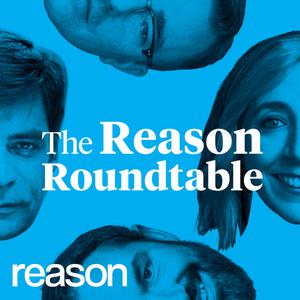 The Reason Roundtable
The Reason Roundtable
 Bob Murphy Show
Bob Murphy Show
 Bound By Oath by IJ
Bound By Oath by IJ
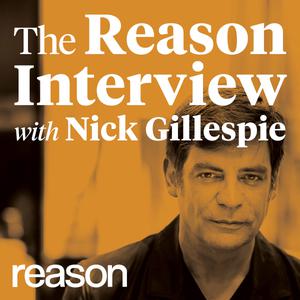 The Reason Interview With Nick Gillespie
The Reason Interview With Nick Gillespie
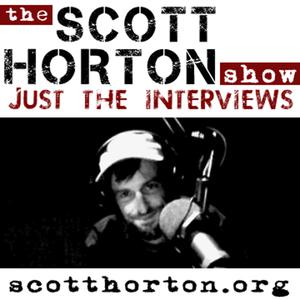 Scott Horton Show - Just the Interviews
Scott Horton Show - Just the Interviews